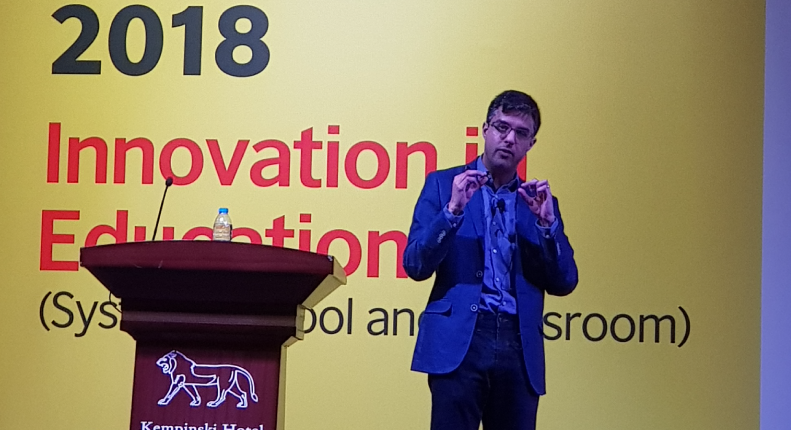Whizz Education’s Director of Education, Dr Junaid Mubeen, recently addressed 300 school leaders and policymakers at the Schools Now! conference in Jordan in March 2018. The conference, organised by the Partner Schools Global Network and the British Council, had “Innovation in Education” as its central theme.
Dr Mubeen’s talk, “Education in the Age of Artificial Intelligence”, challenged the audience to consider the interplay between education and technology. The talk looked back over a century of failed initiatives in EdTech, arguing that technology will only have an impact on education when it is designed and implemented in service of our educational goals.

Drawing on Whizz’s research, Dr Mubeen articulated a pressing challenge faced by educators today: the spread of learning needs in each classroom. In mathematics, this amounts to an average knowledge gap of over four years between students in individual classes, particularly by the time they reach upper primary. To address the individual needs of every learner using solely traditional means, he argued, is impractical and even unachievable.
Having framed the problem, the talk then walked the audience through how Whizz has leveraged artificial intelligence to develop the Maths-Whizz virtual tutoring system. The core design principle behind Maths-Whizz is to simulate the behaviour of a human tutor. Dr Mubeen drew on his own experiences as a tutor to explain how Maths-Whizz captures the pedagogy of individualised tutoring, leading to accelerated gains in students’ mathematical knowledge.
The talk also grappled with the limitations of computer-aided instruction, emphasising that, while virtual tutoring supports some facets of mathematical thinking, others – such as problem-solving and reasoning – can only be done justice in the classroom. Thus virtual tutoring is an enabler of deeper classroom interactions. Dr Mubeen went on to describe Maths-Whizz as a virtual teaching assistant, freeing up teachers to plan and deliver richer lessons. In doing so, he extended the narrative of personalised learning to encompass more than 1:1 tutoring, explaining that the most personalised experiences are situated within the student-teacher relationship.
The talk concluded with a reflection on Whizz’s activities around the world, telling the audience that technology will only amplify our pedagogical intent and that Whizz is constantly challenged to use technology for richer pedagogies, rather than perpetuating flawed instructional practices. Dr Mubeen asserted that innovation is not found in product or technology, but rather how those tools are integrated within the unique context of each learning environment.
The talk was well received, with audience members rushing to the Whizz stand to learn more about how we partner with schools and ministries of education around the world to advance this vision of educational innovation.
